Résultats de recherche de titre
Articles 1495301 à 1495320 sur 1497463
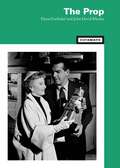
The Prop (Cutaways)
Par John David Rhodes, Elena Gorfinkel. 2025
What are film props? What do they do? This book answers these questions by a close attention to those material…
objects that are used to construct cinematic worlds. The term “prop” is short for property. This truncated term’s etymology belies the expansiveness of the concept and indicates the micro and macro scales at which the prop operates. Props are the material—often literal—furniture of cinema’s diegetic reality. Props are also narrative agents: think of the animacy of objects in Jean Epstein’s account of photogénie, the crystal egg in Risky Business, or the domestic bric-à-brac of Sirk’s melodramas. The prop is central to production design and the construction of mise-en-scène. And yet, the prop has rarely—almost never—been taken as an object of analysis and theorization in its own right. This book begins by tracing the prop’s curious but unacknowledged role in film theory, before proceeding to a series of theoretical speculations and close readings that bring the prop into focus. Analyses of scenes of “prop mastery” demonstrate the labor that props perform and enable, as well as the interpretive work they make possible. Across a variety of genres, modes, and historical contexts—studio filmmaking, art cinema, adult and avant-garde films—The Prop introduces readers to the notion of “prop value,” a quality that puts the prop in proximity to the capitalist commodity, but also provides an ironic distance from the commodity’s subjection to exchange value. Gorfinkel and Rhodes argue that the prop is nothing less than a condensation of how labor, subjection, value, and instrumentality underwrite the very conditions of cinema.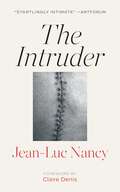
The Intruder
Par Jean-Luc Nancy. 2024
In 1991, Jean-Luc Nancy's heart gave out. In one of the first such procedures in France, a stranger's heart was…
grafted into his body. Numerous complications followed, including more surgeries and lymphatic cancer. The procedure and illnesses he endured revealed to him, in a more visceral way than most of us ever experience, the strangeness of bodily existence itself and surviving the stranger within him. During this same period, Europe began closing its borders to those seeking refuge from war and poverty. Alarmed at this trend and drawn to a highly intimate form of strangeness with which he had been living for years, Nancy set out in The Intruder to articulate how intrusion—whether of a body or a border—is not antithetical to one’s identity but constitutive of it. In 2004, Claire Denis adapted The Intruder into a film already hailed among the most important of our century. This edition includes Nancy’s and Denis’s accounts of turning philosophy into film and the text of a shorter collaboration between the two of them. Throughout, Nancy and Denis push us to recognize that to truly welcome strangers means a constant struggle against exoticism, enforced assimilation, and confidence in our own self-identity.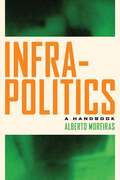
Infrapolitics: A Handbook
Par Alberto Moreiras. 2021
The personal is not political, even if politics marks it and, in many cases, determines it. Infrapolitics seeks to understand…
conditions of existence that are not reducible to political life and that exceed any definition of world bound to political determinations. It seeks to mobilize an exteriority without which politics could only be business or administration, that is, oppression. It demands a change in seeing and an everyday practice that subtracts from political totalization in the name of a new production of desire, of a new emancipation, and of a conception of experience that can breach the general captivation of life.In this book, Alberto Moreiras describes a form of thought aiming to provide content for a form of life and to offer a new theoretical practice for concrete existence. The book provides a genealogy of the notion of infrapolitics and places it within contemporary philosophical reflection, examining its deployment in the wake of postphenomenology and deconstruction, Lacanian analysis, the principle of anarchy, and an egalitarian symbolization of social life. In doing so, Moreiras elaborates Infrapolitics as both a general critique of the political apparatus and as an imperative horizon for existential self-understanding.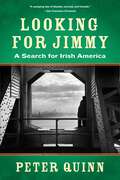
Looking for Jimmy: A Search For Irish America
Par Peter Quinn. 2022
In this stunning work chronicling the author’s exploration of his own past—and the lives of many hundreds of thousands of…
nameless immigrants who struggled alongside his own ancestors—Peter Quinn paints a brilliant new portrait of the Irish-American men and women whose evolving culture and values continue to play such a central role in all of our identities as Americans. In Quinn’s hands, the Irish stereotype of “Paddy” gives way to an image of “Jimmy”—an archetypal Irish-American. From Irish immigration to modern politics, Quinn vibrantly weaves together the story of a remarkable people and their immeasurable contribution to American history and culture.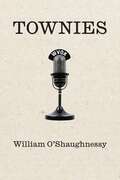
Townies
Par William O'Shaughnessy. 2023
In his six previous books, William O’Shaughnessy, one of the nation’s best known and most beloved community broadcasters, has told…
the tales of the power brokers and visionaries of politics, government, business and industry, the arts, fine living—world famous figures like Joe DiMaggio, Fred Astaire, Nelson Rockefeller, the Bushes, Kennedys, and so many others.He elevated each encounter with his wisdom, wit, insight … and compassion, and what emerged through words that carried the weight of authority as they danced with the delight of Nijinsky was nothing less than transformative for both subject and reader. In O’Shaughnessy, we have our modern day Plutarch, whose prose has run across the decades like a power strip illuminating the lives of the nation’s most incandescent leaders from every arena. Henry Kissinger, Rush Limbaugh, Mario Cuomo, Jacob K. Javits, Daniel Patrick Moynihan, John V. Lindsay, Dan Rather, President Richard Nixon, President Donald J. Trump, Jimmy Breslin, Pope Francis—his list of on-air guests and from-the-notebook subjects is the broadcasting world’s premier who’s who list. A “vivid man about town” known for his blazers, Belgian loafers, and the Yankees World Series ring given to him in appreciation by George M. Steinbrenner, O’Shaughnessy shared the gift of vividness not only with the great and powerful but also with the local characters who made their mark “about town,” the “Townies” of Westchester, a/k/a the “Golden Apple,” and beyond.Folks who may have been touched by fame, they were devoutly invested in the fortunes of their home heath, and O’Shaughnessy amplified their passions, priorities, quests, hurdles, and triumphs as a friend and champion who wielded the most respected and influential “megaphone” in the Eastern Establishment … and far beyond. He shared the counsel and companionship of political influencers, and leading lights from the media, the arts, the sporting world, and the constellation of fine living … who all were blessed with the heart and soul of a Townie.The Townies derives its power to inform and captivate from the radiance of these good people, their good will, and their good deeds, which shine brighter than the lights of Broadway on a Saturday night. Enjoy!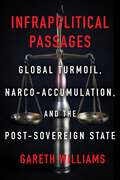
Infrapolitical Passages: Global Turmoil, Narco-Accumulation, and the Post-Sovereign State
Par Gareth Williams. 2021
This book makes a case for infrapolitics as an enactment of intellectual responsibility in the face of a tumultuous world…
of war and of technological value extraction on a planetary scale. Infrapolitical Passages proposes to clear a way through some of the dominant political determinations and violent symptoms of contemporary globalization. In doing so, Gareth Williams makes a case for infrapolitics as an enactment of intellectual responsibility in the face of a tumultuous world of war and of technological value extraction on a planetary scale. The book offers a theory of globalization as a gigantic, directionless crisis in humanity’s symbolic organization, as well as a theory of global economic warfare as the very positing of directionlessness and, at the same time, facticity. Williams’s infrapolitics stands at a distance from the biopolitical, which it understands as domination presenting itself as the production of specific forms of subjectivity in the face of the commodity. The subsequent obscuring of being signals the need to circumvent the instrumentalization of life as subordination to the metaphysics of subjectivity, representation, and politics. Infrapolitical Passages works to confront that which is unavailable in subjectivity and representation, opening a way for facticity in the age of globalization in order to make room for the infrapolitical question for existence.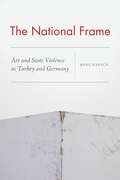
The National Frame: Art and State Violence in Turkey and Germany
Par Banu Karaca. 2021
Based on long-term ethnographic research in the art worlds of Istanbul and Berlin, The National Frame rethinks the politics of…
art by focusing on the role of art in state governance. It argues that artistic practices, arts patronage and sponsorship, collecting and curating art, and the modalities of censorship continue to be refracted through the conceptual lens of the nation-state, despite the globalization of the arts. By examining discussions of the civilizing function of art in Turkey and Germany and particularly moments in which art is seen to cede this function, The National Frame reveals the histories of violence on which the production, circulation, and, very understanding of art are predicated. Karaca examines this darker side of art in two cities in which art and its institutions have been intertwined with symbolic and material dispossession. The particularities of German and Turkish contexts, both marked by attempts to claim modern nationhood through the arts; illuminate how art is staked to memory and erasure, resistance and restoration; and why art has been at once vital and unwieldy for national projects. As art continues to be called upon to engage the past and imagine different futures, The National Frame explores how to reclaim art’s emancipatory potential.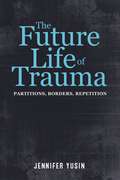
The Future Life of Trauma: Partitions, Borders, Repetition
Par Jennifer Yusin. 2017
The Future Life of Trauma elaborates a transformation in the concepts of trauma and event by situating a groundbreaking encounter…
between psychoanalytic and postcolonial discourse. Proceeding from the formation of psychical life as presented in the Freudian metapsychology, it thinks anew the relation between temporality and traumatized subjectivity, demonstrating how the psychic event, as a traumatic event, is a material reality that alters the character of the structure of repetition.By examining the role of borders in the history of the 1947 partition of British India and the politics of memorialization in postgenocide Rwanda, The Future Life of Trauma brings to light the implications of trauma as a material event in contemporary nation-formation, sovereignty, and geopolitical violence. In showing how the form of the psyche changes in the encounter, it presents a challenge to the category of difference in the condition of identity, resulting in the formation of a concept of life that elaborates a new relation to destruction and finitude by asserting its power to transform itself.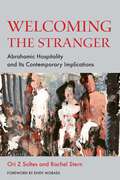
Welcoming the Stranger: Abrahamic Hospitality and Its Contemporary Implications
Par Ori Z Soltes and Rachel Stern. 2024
Embracing hospitality and inclusion in Abrahamic traditionsOne of the signal moments in the narrative of the biblical Abraham is his…
insistent and enthusiastic reception of three strangers, a starting point of inspiration for all three Abrahamic traditions as they evolve and develop the details of their respective teachings. On the one hand, welcoming the stranger by remembering “that you were strangers in the land of Egypt” is enjoined upon the ancient Israelites, and on the other, oppressing the stranger is condemned by their prophets throughout the Hebrew Bible.These sentiments are repeated in the New Testament and the Qur’an and elaborated in the interpretive literatures of Judaism, Christianity, and Islam. Such notions resonate obliquely within the history of India and its Dharmic traditions. On the other hand, they have been seriously challenged throughout history. In the 1830s, America’s “Nativists” sought to emphatically reduce immigration to these shores. A century later, the Holocaust began by the decision of the Nazi German government to turn specific groups of German citizens into strangers. Deliberate marginalization leading to genocide flourished in the next half century from Bosnia and Cambodia to Rwanda. In the aftermath of September 11, 2001, the United States renewed a decisive twist toward closing the door on those seeking refuge, ushering in an era where marginalized religious and ethnic groups around the globe are deemed unwelcome and unwanted.The essays in Welcoming the Stranger explore these issues from historical, theoretical, theological, and practical perspectives, offering an enlightening and compelling discussion of what the Abrahamic traditions teach us regarding welcoming people we don’t know.Welcoming the Stranger: Abrahamic Hospitality and Its Contemporary Implications is available from the publisher on an open-access basis.Published by The Fritz Ascher Society for Persecuted, Ostracized and Banned Art and the Fordham University Institute on Religion, Law and Lawyer’s Work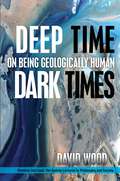
Deep Time, Dark Times: On Being Geologically Human (Thinking Out Loud)
Par David Wood. 2019
The new geological epoch we call the Anthropocene is not just a scientific classification. It marks a radical transformation in…
the background conditions of life on Earth, one taken for granted by much of who we are and what we hope for. Never before has a species possessed both a geological-scale grasp of the history of the Earth and a sober understanding of its own likely fate. Our situation forces us to confront questions both philosophical and of real practical urgency. We need to rethink who “we” are, what agency means today, how to deal with the passions stirred by our circumstances, whether our manner of dwelling on Earth is open to change, and, ultimately, “What is to be done?” Our future, that of our species, and of all the fellow travelers on the planet depend on it.The real-world consequences of climate change bring new significance to some very traditional philosophical questions about reason, agency, responsibility, community, and man’s place in nature. The focus is shifting from imagining and promoting the “good life” to the survival of the species. Deep Time, Dark Times challenges us to reimagine ourselves as a species, taking on a geological consciousness. Drawing promiscuously on the work of Nietzsche, Heidegger, Foucault, Derrida, Deleuze, and other contemporary French thinkers, as well as the science of climate change, David Wood reflects on the historical series of displacements and de-centerings of both the privilege of the Earth, and of the human, from Copernicus through Darwin and Freud to the declaration of the age of the Anthropocene. He argues for the need to develop a new temporal phronesis and to radically rethink who “we” are in respect to solidarity with other humans, and responsibility for the nonhuman stakeholders with which we share the planet. In these brief, lively chapters, Wood poses a range of questions centered on our individual and collective political agency. Might not human exceptionalism be reborn as a sort of hyperbolic responsibility rather than privilege?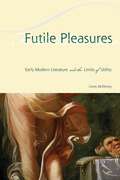
Futile Pleasures: Early Modern Literature and the Limits of Utility
Par Corey McEleney. 2017
Honorable Mention, 2018 MLA Prize for a First BookAgainst the defensive backdrop of countless apologetic justifications for the value of…
literature and the humanities, Futile Pleasures reframes the current conversation by returning to the literary culture of early modern England, a culture whose defensive posture toward literature rivals and shapes our own.During the Renaissance, poets justified the value of their work on the basis of the notion that the purpose of poetry is to please and instruct, that it must be both delightful and useful. At the same time, many of these writers faced the possibility that the pleasures of literature may be in conflict with the demand to be useful and valuable. Analyzing the rhetoric of pleasure and the pleasure of rhetoric in texts by William Shakespeare, Roger Ascham, Thomas Nashe, Edmund Spenser, and John Milton, McEleney explores the ambivalence these writers display toward literature’s potential for useless, frivolous vanity. Tracing that ambivalence forward to the modern era, this book also shows how contemporary critics have recapitulated Renaissance humanist ideals about aesthetic value. Against a longstanding tradition that defensively advocates for the redemptive utility of literature, Futile Pleasures both theorizes and performs the queer pleasures of futility. Without ever losing sight of the costs of those pleasures, McEleney argues that playing with futility may be one way of moving beyond the impasses that modern humanists, like their early modern counterparts, have always faced.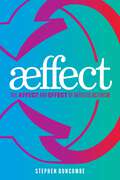
Aeffect: The Affect and Effect of Artistic Activism
Par Stephen Duncombe. 2024
The first book to seriously identify how artistic activism works and how to make it work betterThe past decade has…
seen an explosion in the hybrid practice of “artistic activism,” as artists have turned toward activism to make their work more socially impactful and activists have adopted techniques and perspectives from the arts to make their interventions more creative. Yet questions haunt the practice: Does artistic activism work aesthetically? Does it work politically? And what does “working” even mean when one combines art and activism? In Æffect, author Stephen Duncombe sets out to address these questions at the heart of the field of artistic activism.Written by the co-founder and current Research Director of the internationally recognized Center for Artistic Activism, Æffect draws on Duncombe’s more than twenty-five years of experience in the field and one hundred in-depth interviews with artistic activists worldwide. More than a mere academic exercise, the theory, research, and tools in this book lay the groundwork for artistic activists to evaluate and strengthen their practice and to create better projects. The exploration of good artistic activism is grounded in three sets of concerns. 1) Change: Upon what theories of change is artistic activism based? 2) Intention: What do we hope and expect artistic activism to do, and how does it do this? 3) Evaluation: What actually happens as the result of an artistic activist intervention? Can it be measured?Æffect is rich with examples that demonstrate successful artistic activism, including Undocubus, an old bus painted “No Fear” across its side that was driven cross-country by a group of undocumented immigrant activists; Journal Rappé, a video show created by Senegalese rappers who created long-form investigative reports by rapping the current news in French and Wolof; and War on Smog, a staged a public performance piece by artistic activists in the city of Chongqing in Southwest China. Scannable QR codes are included to provide tools that help readers assess the æffect of their artistic activism.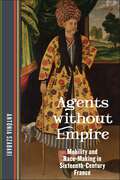
Agents without Empire: Mobility and Race-Making in Sixteenth-Century France
Par Antónia Szabari. 2024
It is well known that Renaissance culture gave an empowering role to the individual and thereby to agency. But how…
does race factor into this culture of empowerment? Canonical French authors like Rabelais and Montaigne have been celebrated for their flexible worldviews and interest in the difference of non-French cultures both inside and outside of Europe. As a result, this period in French cultural history has come to be valued as an exceptional era of cultural opening toward others. Agents without Empire shows that such a celebration is, at the very least, problematic. Szabari argues that before the rise of the French colonial empire, medieval categories of race based on the redemption story were recast through accounts of the Ottoman Empire that were made accessible, in a sudden and unprecedented manner, to agents of the French crown. Spying performed by Frenchmen in the Ottoman Empire in the sixteenth century permeated French culture in large part because those who spied also worked as knowledge producers, propagandists, and artists. The practice changed what it meant to be cultured and elite by creating new avenues of race- and gender-specific consumption for French and European men that affected all areas of sophisticated culture including literature, politics, prints, dressing, personal hygiene, and leisure.Agents without Empire explores race making in this period of European history in the context of diplomatic reposts, travel accounts, natural history, propaganda, religious literature, poetry, theater, fiction, and cheap print. It intervenes in conversations in whiteness studies, race theory, theories of agency and matter, and the history of diplomacy and spying to offer a new account of race making in early modern Europe.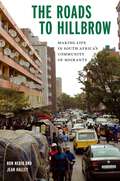
The Roads to Hillbrow: Making Life in South Africa's Community of Migrants (Polis: Fordham Series in Urban Studies)
Par Jean Halley, Ron Nerio. 2022
This highly accessible portrayal of a post-apartheid neighborhood in transition analyzes the relationship between identity, migration, and place.Since it was…
founded in 1894, amidst Johannesburg’s transformation from a mining town into the largest city in southern Africa, Hillbrow has been a community of migrants. As the “city of gold” accumulated wealth on the backs of migrant laborers from southern Africa, Jewish Eastern Europeans who had fled pogroms joined other Europeans and white South Africans in this emerging suburb. After World War II, Hillbrow became a landscape of high-rises that lured western and southern Europeans seeking prosperity in South Africa’s booming economy. By the 1980s, Hillbrow housed some of the most vibrant and visible queer spaces on the continent while also attracting thousands of Indian and Black South Africans who defied apartheid laws to live near the city center. Filling the void for a book about migration within the Global South, The Roads to Hillbrow explores how one South African neighborhood transformed from a white suburb under apartheid into a “grey zone” during the 1970s and 1980s to become a “port of entry” for people from at least twenty-five African countries. The Roads to Hillbrow explores the diverse experiences of domestic and transnational migrants who have made their way to this South African community following war, economic dislocation, and the social trauma of apartheid. Authors Ron Nerio and Jean Halley weave sociology, history, memoir, and queer studies with stories drawn from more than 100 interviews. Topics cover the search for employment, options for housing, support for unaccompanied minors, possibilities for queer expression, the creation of safe parks for children, and the challenges of living without documents. Current residents of Hillbrow also discuss how they cope with inequality, xenophobia, high levels of crime, and the harsh economic impacts of COVID-19.Many of the book’s interviewees arrived in Hillbrow seeking not only to gain better futures for themselves but also to support family members in rural parts of South Africa or in their countries of origin. Some immerse themselves in justice work, while others develop LGBTQ+ support networks, join religious and community groups, or engage in artistic expression. By emphasizing the disparate voices of migrants and people who work with migrants, this book shows how the people of Hillbrow form connections and adapt to adversity.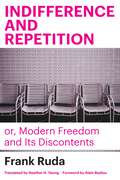
Indifference and Repetition; or, Modern Freedom and Its Discontents
Par Frank Ruda. 2024
In capitalism human beings act as if they are mere animals. So we hear repeatedly in the history of modern…
philosophy. Indifference and Repetition examines how modern philosophy, largely coextensive with a particular boost in capitalism’s development, registers the reductive and regressive tendencies produced by capitalism’s effect on individuals and society.Ruda examines a problem that has invisibly been shaping the history of modern, especially rationalist philosophical thought, a problem of misunderstanding freedom. Thinkers like Descartes, Kant, Hegel, and Marx claim that there are conceptions and interpretations of freedom that lead the subjects of these interpretations to no longer act and think freely. They are often unwillingly led into unfreedom. It is thus possible that even “freedom” enslaves. Modern philosophical rationalism, whose conceptual genealogy the books traces and unfolds, assigns a name to this peculiar form of domination by means of freedom: indifference. Indifference is a name for the assumption that freedom is something that human beings have: a given, a natural possession. When we think freedom is natural or a possession we lose freedom. Modern philosophy, Ruda shows, takes its shape through repeated attacks on freedom as indifference; it is the owl that begins its flight, so that the days of unfreedom will turn to dusk.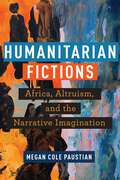
Humanitarian Fictions: Africa, Altruism, and the Narrative Imagination
Par Megan Cole Paustian. 2024
Humanitarianism has a narrative problem. Far too often, aid to Africa is envisioned through a tale of Western heroes saving…
African sufferers. While labeling white savior narratives has become a familiar gesture, it doesn’t tell us much about the story as story. Humanitarian Fictions aims to understand the workings of humanitarian literature, as they engage with and critique narratives of Africa.Overlapping with but distinct from human rights, humanitarianism centers on a relationship of assistance, focusing less on rights than on needs, less on legal frameworks than moral ones, less on the problem than on the nonstate solution. Tracing the white savior narrative back to religious missionaries of the nineteenth century, Humanitarian Fictions reveals the influence of religious thought on seemingly secular institutions and uncovers a spiritual, collectivist streak in the discourse of humanity. Because the humanitarian model of care transcends the boundaries of the state, and its networks touch much of the globe, Humanitarian Fictions redraws the boundaries of literary classification based on a shared problem space rather than a shared national space. The book maps a transnational vein of Anglophone literature about Africa that features missionaries, humanitarians, and their so-called beneficiaries. Putting humanitarian thought in conversation with postcolonial critique, this book brings together African, British, and U.S. writers typically read within separate traditions. Paustian shows how the novel—with its profound sensitivity to narrative—can enrich the critique of white saviorism while also imagining alternatives that give African agency its due.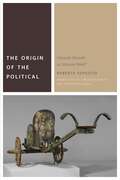
The Origin of the Political: Hannah Arendt or Simone Weil? (Commonalities)
Par Roberto Esposito. 2017
In this book Roberto Esposito explores the conceptual trajectories of two of the twentieth century’s most vital thinkers of the…
political: Hannah Arendt and Simone Weil. Taking Homer’s Iliad—that “great prism through which every gesture has the possibility of becoming public, precisely by being observed by others”— as the common origin and point of departure for our understanding of Western philosophical and political traditions, Esposito examines the foundational relation between war and the political.Drawing actively and extensively on Arendt’s and Weil’s voluminous writings, but also sparring with thinkers from Marx to Heidegger, The Origin of the Political traverses the relation between polemos and polis, between Greece, Rome, God, force, technicity, evil, and the extension of the Christian imperial tradition, while at the same time delineating the conceptual and hermeneutic ground for the development of Esposito’s notion and practice of “the impolitical.”In Esposito’s account Arendt and Weil emerge “in the inverse of the other’s thought, in the shadow of the other’s light,” to “think what the thought of the other excludes not as something that is foreign, but rather as something that appears unthinkable and, for that very reason, remains to be thought.” Moving slowly toward their conceptualizations of love and heroism, Esposito unravels the West’s illusory metaphysical dream of peace, obliging us to reevaluate ceaselessly what it means to be responsible in the wake of past and contemporary forms of war.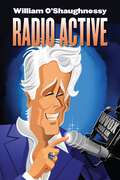
Radio Active
Par William O'Shaughnessy. 2019
Radio Active is William O’Shaughnessy’s fifth collection of essays, on-air interviews, tributes and eulogies, endorsements, recollections of an evening, and…
more from “perhaps the finest broadcaster in America” whose commentaries are akin to “potato chips” per former Secretary of State Henry Kissinger because “You can’t stop with only one.”The book opens with a ringing signature defense of the First Amendment and collected O’Shaughnessy correspondence with heroes and “villains,” and insightful sections honoring former New York Governor Mario Cuomo, who said, “When O’Shaughnessy is on his game . . . he’s better than anyone on the air or in print.” There is also a section on the estimable Bush family.In eliciting “provocative and candid revelations” from his wide circle, this new compendium pulses with brilliant, insightful prose and a life-affirming reverence for luminous people, places, and events, past and present.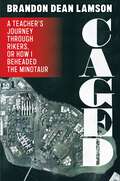
Caged: A Teacher's Journey Through Rikers, or How I Beheaded the Minotaur
Par Brandon Dean Lamson. 2023
An honest and gripping memoir of one man’s life-altering experience teaching at Rikers Island.When Brandon Dean Lamson first accepted the…
teaching position at Horizon Academy, a court-mandated academic program for eighteen- to twenty-year-old prisoners at Rikers Island, even he had to question his own motivation. Why was he risking his life every day at a prison notorious for being one of the most dangerous places to work? Was it his small way of making amends for the blatant and pervasive racism he witnessed every day growing up in his small Southern town? Or was it to prove he wasn’t afraid to go where his own father, a prominent District Court judge, had sent both the innocent and guilty alike? In Caged, Lamson provides an intimate view of his transformative experience teaching inmate students on Rikers Island.Rikers Island resonates as a place of horrific violence and inescapable punishment, one of the last places in America that truly invoke overwhelming, universal fear. Set in the late 1990s—a time when the city was rapidly changing into an increasingly corporatized and policed space—Caged exposes a criminal justice system designed to thwart efforts to rehabilitate and educate the incarcerated. Lamson’s first-hand account illustrates how penitentiaries too often use prison education as another means of control.Written in a gripping, confessional narrative, Caged explores the consequential impact of Lamson’s move to New York City, his childhood experiences with racial justice, and his journey working in four prisons over the course of three years. Lamson provides glimpses into his own self-destructive behavior as parallels emerge between his life on Rikers and his personal life, his white privilege, and how his behavior progressively entraps him in ways that resonate with the challenges faced by his students. The book intimately captures how incarceration changes both prisoner and educator alike as Lamson struggles to integrate into life outside prison after his departure from Horizon Academy.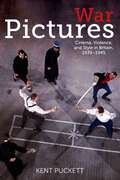
In this original and engaging work, author Kent Puckett looks at how British filmmakers imagined, saw, and sought to represent…
its war during wartime through film. The Second World War posed unique representational challenges to Britain’s filmmakers. Because of its logistical enormity, the unprecedented scope of its destruction, its conceptual status as total, and the way it affected everyday life through aerial bombing, blackouts, rationing, and the demands of total mobilization, World War II created new, critical opportunities for cinematic representation.Beginning with a close and critical analysis of Britain’s cultural scene, War Pictures examines where the historiography of war, the philosophy of violence, and aesthetics come together. Focusing on three films made in Britain during the second half of the Second World War—Michael Powell and Emeric Pressburger’s The Life and Death of Colonel Blimp (1943), Lawrence Olivier’s Henry V (1944), and David Lean’s Brief Encounter (1945)—Puckett treats these movies as objects of considerable historical interest but also as works that exploit the full resources of cinematic technique to engage with the idea, experience, and political complexity of war. By examining how cinema functioned as propaganda, criticism, and a form of self-analysis, War Pictures reveals how British filmmakers, writers, critics, and politicians understood the nature and consequence of total war as it related to ideas about freedom and security, national character, and the daunting persistence of human violence. While Powell and Pressburger, Olivier, and Lean developed deeply self-conscious wartime films, their specific and strategic use of cinematic eccentricity was an aesthetic response to broader contradictions that characterized the homefront in Britain between 1939 and 1945. This stylistic eccentricity shaped British thinking about war, violence, and commitment as well as both an answer to and an expression of a more general violence.Although War Pictures focuses on a particularly intense moment in time, Puckett uses that particularity to make a larger argument about the pressure that war puts on aesthetic representation, past and present. Through cinema, Britain grappled with the paradoxical notion that, in order to preserve its character, it had not only to fight and to win but also to abandon exactly those old decencies, those “sporting-club rules,” that it sought also to protect.